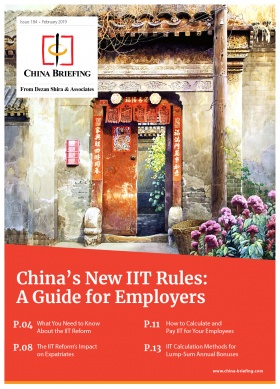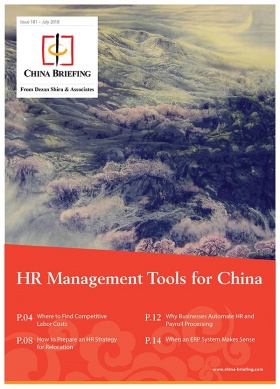Hiring Staff in China: 8 Quick Tips for Managers
Helen Kong, Human Resources Manager at Dezan Shira & Associates offers eight quick tips to handle the fundamentals of hiring staff in China.
A firm understanding of China’s laws and regulations relating to human resources and payroll management is essential for foreign investors who want to establish or are already running foreign-invested entities in China.
In China, there are a wide range of government institutions involved in HR processes, and while key laws are drafted by the central government – such as the Labor Contract Law – numerous bylaws and regulations are instituted at the local level.
Nevertheless, many HR laws and principles are fairly universal across China. Here, we offer eight quick tips to handle the fundamentals of employing staff in China.
1. Mandatory written contracts
All employees must be given a written contract within one month of hiring; if not, the employee is entitled to double salary.
2. Probation period
The range of legitimate grounds for dismissing an employee is considerably wider during his or her probation period. The employer may also pay only 80 percent of the employee’s contractual salary during this time.
3. Regional variation
National laws are often intentionally broad and vague, leaving a lot of room for local interpretation or additional legislation. Regulations and practices differ per city on issues such as minimum wage, work visa policy, social security contributions, and maternity leave.
4. Representative offices
The simplest of foreign investment vehicles in China, the representative office (RO) is not permitted to directly hire staff in China; instead, they need to use dispatch agencies, the agencies must hold a government issued special license that allow them to hire employees on behalf of their clients (e.g. Dezan Shira & Associates has dispatch licenses).
5. Leave during the first year of employment
Employees are not entitled to any mandatory minimum number of leave days during their first year of employment, except those during major holidays such as Chinese New Year around February, and the National Day celebrations in early October.
6. No at-will termination
Terminating employees in China is both difficult and expensive. Employees may resign with 30 days’ notice, but for employers, there are limited grounds for terminating an employee before his or her contract has come to an end.
7. Non-fixed term contract after two fixed term contracts
After an employee finishes his or her second contract with your company, he or she generally shall be offered a lifetime contract as the third unless he or she wants another fixed term contract instead. Such non-fixed term contract can only be terminated if there are grounds for dismissal. Notably, some regions, such as Shanghai, offer more flexibility on this rule.
8. Severance payments mandated by law
In practice, severance payments are even higher than the law prescribes, and can comprise a significant part of overall HR costs.
About Us
China Briefing is produced by Dezan Shira & Associates. The firm assists foreign investors throughout Asia from offices across the world, including in Dalian, Beijing, Shanghai, Guangzhou, Shenzhen, and Hong Kong. Readers may write to china@dezshira.com for more support on doing business in China.
- Previous Article China’s New VAT Rates: Prepare for May 1 Transition
- Next Article The Beijing-Tianjin-Hebei Integration Plan








